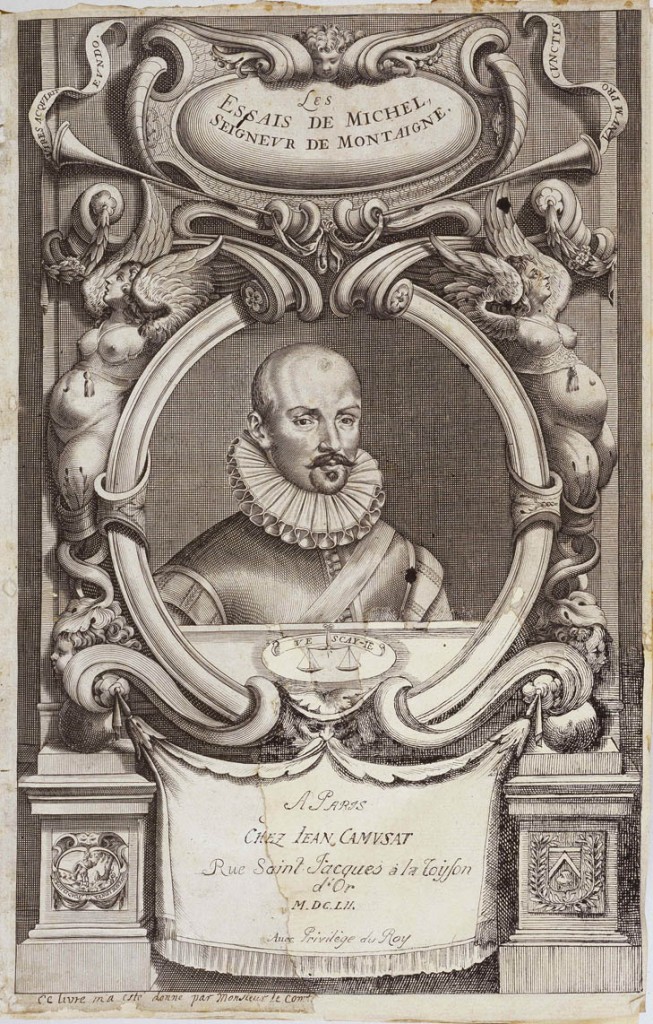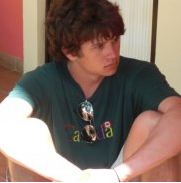/
In the essay “On Experience” Michel de Montaigne writes, “I study myself more than any other subject. That is my metaphysics{{1}}[[1]]See Mappa Mundi: The Structure of Western Thought[[1]]; that is my physics.” At first glance this statement seems generally narcissistic, even flamboyantly so. Essentially, Montaigne disregards the entire study of philosophy up until his own time and replaces it with his own idea of philosophy. He uses the word “me” to both express the idea of ownership of the philosophy but also to emphasize his philosophy is based on examination of the self. It is obvious that Montaigne studied many others, in addition to himself, and clearly understood their importance because he quotes them throughout the essay. Montaigne’s words, therefore, are not narcissistic: he is not saying he is self-obsessed. Rather Montaigne is trying to emphasize the human, not as a thinking animal, nor as a philosopher, but as someone who, while thinking and reasoning also lives in and is affected by the world. A human who, to borrow a term from Montaigne, “shits.” I will argue, in other words, that what Montaigne emphasizes is that humans are a composite and it is our full composition that makes us human; to deny our sensuousness is to deny our humanity, but at the same time to deny our rationality is also to deny our humanity. Montaigne’s essay is about how these two halves of the human must be used in conjunction to gain knowledge, understanding, or truth.
Montaigne begins the essay with a line borrowed from Aristotle’s Metaphysics: “No desire is more natural than the desire for knowledge.” The quote announces that the essay is going to be about the acquisition of knowledge. It is as if Montaigne is pointing out that he is doing the same thing Aristotle tried to; starting from the same basic platform of thought, how to gain knowledge and understanding, and writing about it in a new way. The interesting thing about Montaigne opening “On Experience” with a quote by an ancient is that it seems to both mimic the ancients and to name the people who will be the opponents in the essay. The ancients believed that the pathway to knowledge was in the mind alone, and that is what Montaigne would like to refute. In the body of his essay he discusses by way of implicative and digressive examples the importance of a composite human (both thinking and experiencing). First he points out failings in reason and then points out failings in experience. Montaigne comes to the conclusion that the only way to acquire knowledge, truth or understanding lies within the composite human — a thinking, and sensuous being.
First Montaigne discusses the failures of reason or contemplative thinking-a thing implied to be purely of the mind, and to have direct connection to the senses. What’s crucially different about Montaigne’s thinking, and what distinguishes him from the ancients, is that first reason is not perfect and second that senses can help to make up for reason’s imperfections. Montaigne writes, “We assay all the means that can lead us to [knowledge]. When reason fails us we make use of experience.” These lines can be read on two levels. On one level, they suggest that humans will naturally try to contemplate things first to gain knowledge. But on a second level, the line seems to claim that “we”, meaning epistemological theorists, have tried everything possible to find knowledge and now it seems that just thinking about forms or God is not enough: “we” now need to examine our own experiences. Montaigne’s gives examples of reason failing during his discussion on laws. He declares that “the most desirable laws are those which are fewest, simplest and most general.” This line describes a desire to reduce the number of laws, in order to find a more general set. The law makers “have so weighed down every syllable and every species of conjunction that they end up entangled and bogged down in an infinitude of grammatical functions and tiny sub-clauses which defy all rule and order and any definite interpretation.” Montaigne thinks that laws are a demonstrative example of reason failing because the amount, complexity, and particularization are all due to an over thinking by the law makers. To Montaigne the laws are a downfall of reason because they move away from a general interpretation of, in this case, justice to multiple interpretations. And “you can feel from experience that so many interpretations dissipate the truth and break it up.” This quote is crucial to Montaigne’s argument because he is pointing out that where reason fails experience points to the mistake. So to Montaigne laws are best made by someone who uses reason to create the law but experience to measure its applicability. And that is to say that a composite human is best suited for making laws, understanding justice, or more generally, grasping the truth.
Montaigne’s emphasis on a new composite human thinking process is, it seems, developed from the skeptical viewpoint that “reason has so many forms that we do not know which to resort to: [and] experience has no fewer.” In other words, there are so many ways to experience that “induction which we wish to draw from the likeness between events is unsure since they all show unlikeness.” And that is to say that in any similarity we can find between two forms of experience, any “likeness”, there is inherently difference because according to Montaigne “Nature has bound herself to make nothing “other” which is not unlike.” In other words nothing can be a separate thing and be completely identical to another thing. This pervasive difference makes experience an inherently faulty way of examining the world. As an example of experience failing Montaigne writes, “Scientific investigations and inquiries serve merely to feed our curiosity. They have nothing to do with knowledge so sublime.” Here where experience, in this case scientific observation, fails to gather the deepest truth; reason can provide support. The crucial idea to understand is that to Montaigne truth cannot be grasped by experience alone. Experience needs to be filtered by the mind in order for it to elucidate any truths or knowledge. This filtering process is what a composite human, both a thinking and sensing, would intuitively do, and which is what Montaigne believes is the way to truth, knowledge or understanding.
Montaigne concludes “On Experience” with a description of himself. The point of this section is to demonstrate the human as a composite. What Montaigne does here is take something he calls his metaphysics, thereby comparing it with The Metaphysics, and then writes about his “mortal fear of smells.” Montaigne wants to show the examination of the self can be a philosophical act. That is to say that experience can be a philosophical act. And this emphasis on self-examination is another example of Montaigne’s argument to find certainty within a world saturated with difference. Montaigne brings together the two halves of the composite human with the sentence “things are sensed through the understanding [and] understood through the senses.” In other words the halves are dependent upon the other to function. For someone to sense something he needs to know they are sensing it; for someone to understand something it must pass first through the senses. To Montaigne the human is body and mind and for a human to have understanding, or know truth he must use both parts of his duality.
To Montaigne difference and uncertainty pervade the world and make it impossible to glean any knowledge through the application of either reason or experience alone. But, as I have argued, these two tools used in conjunction are the key to understanding the world and gathering any truth. Montaigne writes, “All things are connected by some similarity; yet every example limps and any correspondence which we draw from experience is feeble and imperfect; we can nevertheless find some corner or other by which to link our comparisons.” That is to say that there are indeed similarities or certainties in the world, but we cannot purely sense them nor purely contemplate upon them. To Montaigne we can examine ourselves and therefore our sensual experience with, and along side of, our reason to find that subtle certainty and similarity in the very difference that subsists throughout the world. Montaigne finds a most basic certainty in the embrace of our composite selves as a necessity to glean knowledge, truth or understanding.
— Jacob Glover
/
/


Jacob,
This essay is quite impressive. I think I like the poetry of the language as much as the ideas. I must confess this is my first exposure to Montaigne and suspect it is a good one.
If you’re of a mind, any thoughts on why we should read Montaigne today?
Gary,
Thanks for reading my essay.
I think the most important reason to read Montaigne is that he invented the essay. The modern essay they teach these days in universities tends to be thesis-driven, unlike Montaigne’s more organic evolving, sort of, writer’s inclination driven form. I think if we could somehow get back to that way of writing people would be writing essays with more voice in them. Perhaps this could provide for some pretty horrendous essays, but, if there’s one thing my dad is trying to teach me it is to put my own thoughts in my essays, and it seems to be working. So maybe there is some happy medium, a composite essay, if you will. Something both full of voice but at the same time driven by some focal idea.
Anyway, I hope this is an adequate answer.
Jake
Jake,
It is a wonderful answer and it helps me see your essay in yet another light. Voice is what most impressed me.
I have been teaching college comp for over twenty-five years, and I can tell you that voice has been put aside. I would encourage you to pursue your interests in a career if I didn’t know what you’re up against. Study the field carefully if you ever consider doing so.
Hi Jacob
— this is Julie, another former student of your dad’s writing —
I can’t find a way to comment at this date so am replying instead, even though no one’s asked me anything! Thank you for vastly improving my composite disposition this morning. I got to read Montaigne in college, too. We read Donald Frame’s translation. One line I remember was something like “we spend so much time taking care of our souls, we neglect taking care of our bodies.” I paraphrase. Maybe it’s from ‘On Experience?” I also loved the exploratory drive in Montaigne’s essays, how they were in constant revision (in the edition I read, Frame clarified the revisions by putting dates after each one — or did Montaigne do that himself?). The texts seemed alive and yes full of voice(s) and never oversimplified.
Don’t you feel lucky to go to a “Great Books” college? I believe Montaigne had an interesting education himself, all his learning steeped in the experience of spending much of his youth living with farmers/peasants — I think this was his father’s idea. So his own education combined experience and reason in interesting ways, unusual at that time. Anyway, cheers! … J Marden
Jake,
You might enjoy thumbing through Phillip Lopate’s anthology The Art of the Personal Essay. Lopate’s introduction is rather general, but informative. Montaigne is featured, of course, and I’m going to put those essays on my reading list.
Gary
I’ll look around for those essays. Thanks for the suggestion.